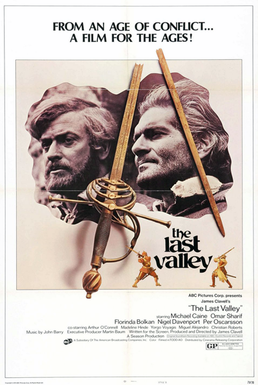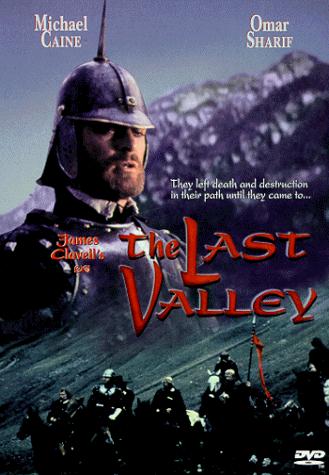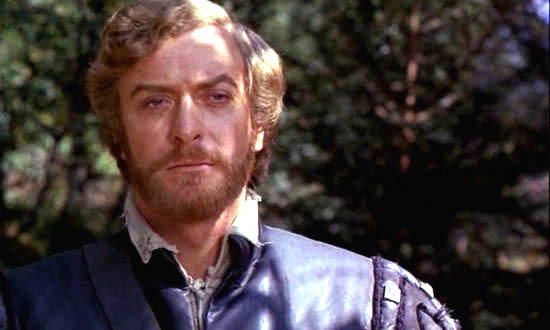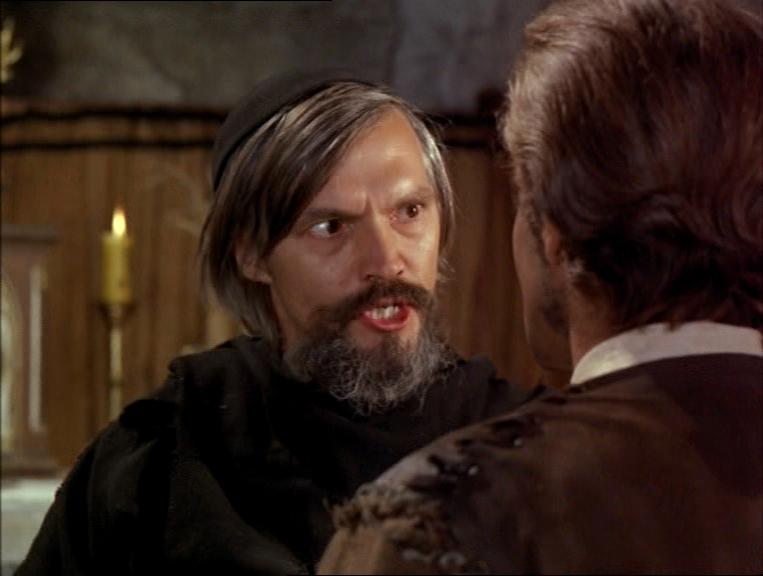

THE LAST VALLEY (1971)
This greatly under-rated movie is a fictional piece set in the Thirty Years War which began in 1618. A former teacher named Vogel (Omar Sharif) stumbles upon a village in the mountains that is untouched by the war or the Great Plague, a village rich in all the things, especially food, that the rest of Germany and Europe has long since run out. Vogel finds the village at the same time as a band of bloodthirsty mercenaries led by ‘The Captain’ (Michael Caine), and manages to convince him to winter in the village. He also suggests he can be useful as a negotiator between the captain and the villagers’ leader, a man named Gruber. The mercenaries are a mixture of Catholics, Protestants, Baptists and others, held together, albeit precariously, by the captain’s ruthless discipline. The Catholic priest in the village Father Sebastian (Per Oscarsson), is a fanatic and feared by almost everyone except the captain.
In order to keep the valley hidden from visitors, the captain decides to move the small shrine that points towards the village ‘like a beacon’, about thirty metres and out of sight of the main mountain trail. The villagers and the Catholics in his band consider it sacrilege to even touch it and are determined to prevent the move. Father Sebastian prepares to stand firm with the villagers until the captain gives him an ultimatum:

The captain delivers an ultimatum to Father Sebastian in The Last Valley
Captain: ‘Father, you will talk on my behalf or make your peace with your God – for you and them. There will be no quarter, not for man woman or child, and you will be castrated before I hack off your feet!’

Father Sebastian (Per Oscarsson) berates Vogel (Omar Sharif)
Vogel defuses the situation by telling the villagers he had a dream in which he saw the shrine ‘vanish’, thus hiding the village from a band of soldiers advancing along the trail. ‘You wouldn’t defy a dream, would you?’ he asked the crowd. Hours later, he is summoned by Father Sebastian:
Vogel: ‘You wanted to see me?’
Sebastian: ‘Did you really dream that dream?’
Vogel: ‘What’s real and what isn’t? Once I thought I knew. Now I don’t.’
Sebastian: ‘The true Church is real. God is real and Satan is real. That we are all going to die soon and face judgment is real. Before God – did you tell the truth?’
Vogel: ‘Before God, what is the truth? That millions are dead and more will die because the Pope wars on the Catholic Emperor who wars on the Catholic King of France; who wars on the Catholic King of Spain who wars on Catholic Germany – all helped by Protestants, helped by a hundred other princes, kings and bishops – all for their own rotten purposes!’
Sebastian: ‘Nothing is simple. Nothing except faith in God. You ask questions only God can answer.’
Vogel: ‘God is an excuse that is used too often!’
Sebastian: ‘You blaspheme! Life exists because of a divine pattern. You must have faith and believe or God will cast your immortal soul into the pit!’
Vogel: ‘Look to your own soul, priest!’

Vogel and the captain (Michael Caine) discuss Magdeburg
As winter settles on the village, closing it in until summer, the captain and Vogel have time to converse and reflect:
Captain: ‘Vogel, this valley is so peaceful. It would be very easy to become possessed by it.’
Vogel: ‘Does it make you feel in the presence of God, captain?’
Captain: ‘Don’t talk to me of God. We killed God at Magdeburg. We laid that city flat; butchered men, women and children, twenty-thirty thousand. And then we burned the lot.’
Vogel: ‘Why?’
Captain: ‘Vengeance. You know, that was vengeance for one of our cities, which was vengeance for one of their towns, for one of our villages for one of their hamlets, which was probably destroyed in the first place to give some fat little princeling a better view of the Rhine!’ Magdeburg is that simple.’
Vogel: ‘My family were there. My father, mother, my wife and my son.’
Captain: ‘Oh. Then they have been dead twelve long years. We all have things we would like to forget. Magdeburg is mine. What is yours, Vogel?’

The captain uncovers evidence that witchcraft is being practiced in the village and asks Vogel his views on the subject:
Captain: ‘Tell me, what do you think of witchcraft?’
Vogel: ‘Both religions burn witches, captain – Catholics, Protestants; Luther was violent against them, Calvin equally. Why?’
Captain: ‘Can witches cast spells? Huh?’
Vogel: ‘My sister was accused of witchcraft. By whom we never knew. She confessed that the Devil was her lover and came to her bed every night. She was six years old! Her trial was legal, the unspeakable things they did to her, before and after she confessed, legal! Her burning – legal! Of course, witches cast spells. I have to believe it. How else could a man remain sane? If they can’t, then ten, twenty thousand innocent men, women and children are falsely accused, brutally tortured until they confess, and murdered each year in Germany alone. All in the name of God!’
Captain: ‘Nations are murdered in the name of God! You are so naïve. You want to look under the plate they put the food on. There’s no need for that. Nothing’s hidden.’

Writer/director James Clavell
It is 1638. Advised by a traveller that the mercenary army of Prince Bernhard of Saxe-Weimar is about to cross the bridge at Rheinfelden to fight against a Bavarian and Holy Roman Empire army, the captain tells Graf, his second in command, to prepare to leave the village and go to the prince’s aid:
Captain: ‘Graf, we will join Prince Bernhard and help him cross the bridge.’
Sebastian: ‘Why join the enemy? You fought for the Emperor. You fought the just war.’
Captain: ‘You dare to speak to me of enemies and just wars? There is no just war. You know it; everyone knows it. The truth is your leaders are bigots, your generals are bandits; you employ any mercenary you can get and the Pope plays politics! The truth is your war is filth, greed and hypocrisy – and the other side is just as rotten!’ All sides are rotten, except for people like you, religious fanatics who incite murder for the sake of a God they have never known.’
Sebastian: ‘The world is as it is. Men are what they are – sinners. And your mind is sick and it will lead you straight to hell!’
Captain: ‘There is no hell! Don’t you understand? Because there is no God! There never was. Don’t you understand? There is no God! It’s a legend.’
The Last Valley, in spite of brilliant performances (especially from Caine and Oscarsson), did not do well at the box-office. Even the outstanding score by John Barry was overlooked at Oscar-time. The subject matter was simply too controversial, too anti-religion. Australian writer/director James Clavell was a known and outspoken atheist, and his book and screenplay upset all sects across the board. Caine delivered (in my opinion) the performance of his life – and was generally ridiculed for it!

One of my favorite movie. I agree that it’s full of quotable dialog. I also agree that this is possibly Caine’s best performance, or at the very least one of his greatest.
Having loved Last Valley, I sought out and purchased a used copy of the source material, a novel by J.B. Pick. The film was fairly faithful to Pick’s work; some of the best lines in the film were lifted nearly intact from there. I do not mean to diminish Clavell by saying this – if anything it meant he was canny enough to sift out the best stuff, and use it well in his film.
Great film! I only discovered it recently. Part of me wondered why it had been neglected, but another part of me understood immediately—epic films only do well with a general audience when the Christians are the good guys. Another more recent film that suffered in both ratings and box office receipts because of its critique of religious zealotry was “Agora”. Like “The Last Valley”, it had stunning cinematography, a beautiful score, and heartfelt, intelligent performances from a talented cast, but it failed to pander to Christians.
I could not agree more, mate. The last thing a movie-maker wants to do is bug the Christian fraternity. They have little tolerance.